An Analysis of Emotional Intelligence in Leadership Effectiveness
VerifiedAdded on 2020/12/09
|9
|2381
|464
Report
AI Summary
This report provides a comprehensive analysis of emotional intelligence (EI) and its impact on leadership effectiveness. It begins by defining EI and its key components, such as self-awareness, self-management, motivation, empathy, and social skills, and then explores the concept of leadership effectiveness. The report delves into various theories and models of EI and leadership, including the Goleman theory and the Mayer model, along with leadership effectiveness theories, such as trait, contingency, and transactional theories. It critically examines the strengths and weaknesses of these theories and models. Furthermore, the report identifies the challenges faced by organizational leaders, such as lack of clear direction, conflicts, poor communication, lack of awareness, and poor accountability, and discusses the relevance of EI in addressing these challenges. The conclusion summarizes the key findings, emphasizing the importance of EI in fostering effective leadership.
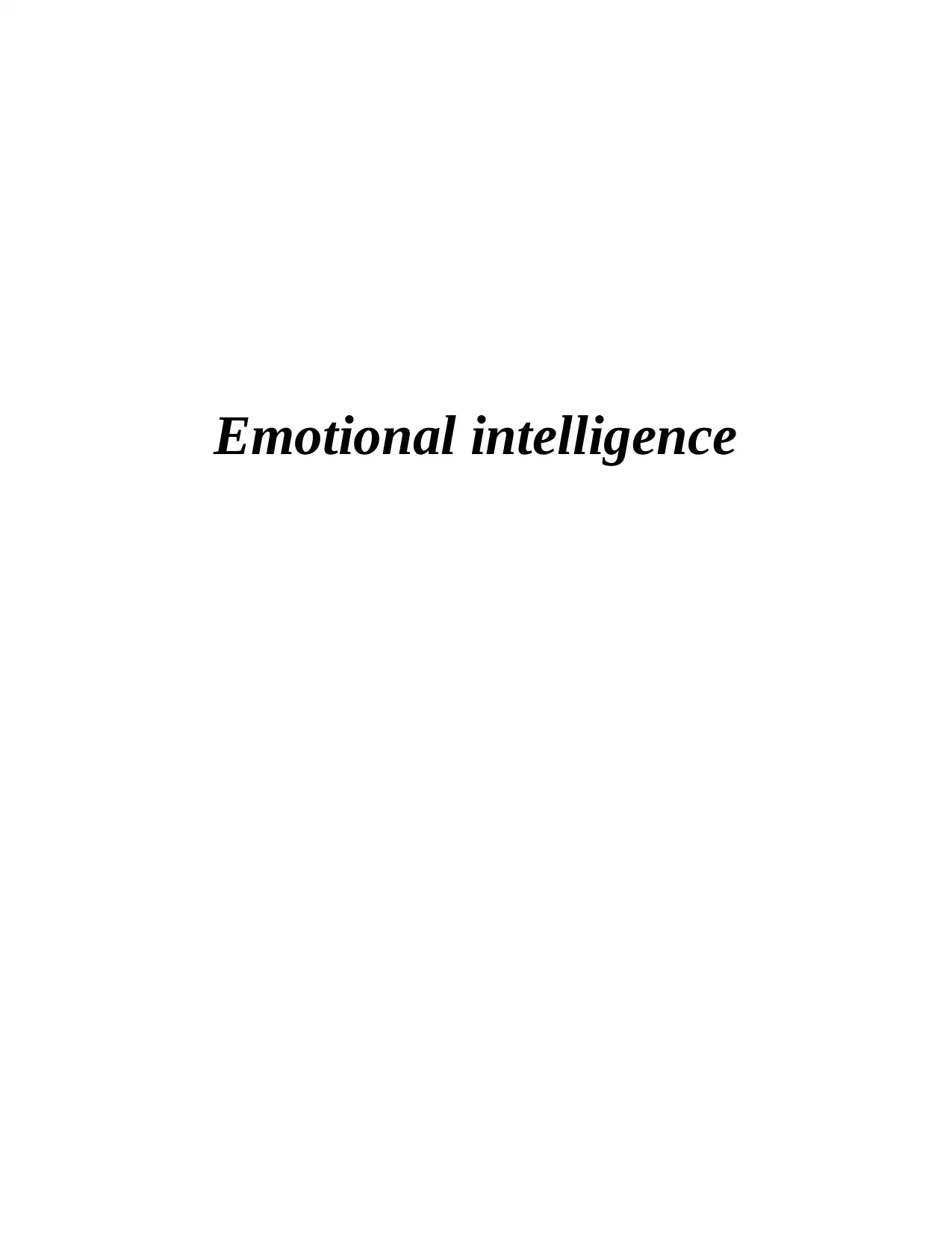
Emotional intelligence
Paraphrase This Document
Need a fresh take? Get an instant paraphrase of this document with our AI Paraphraser
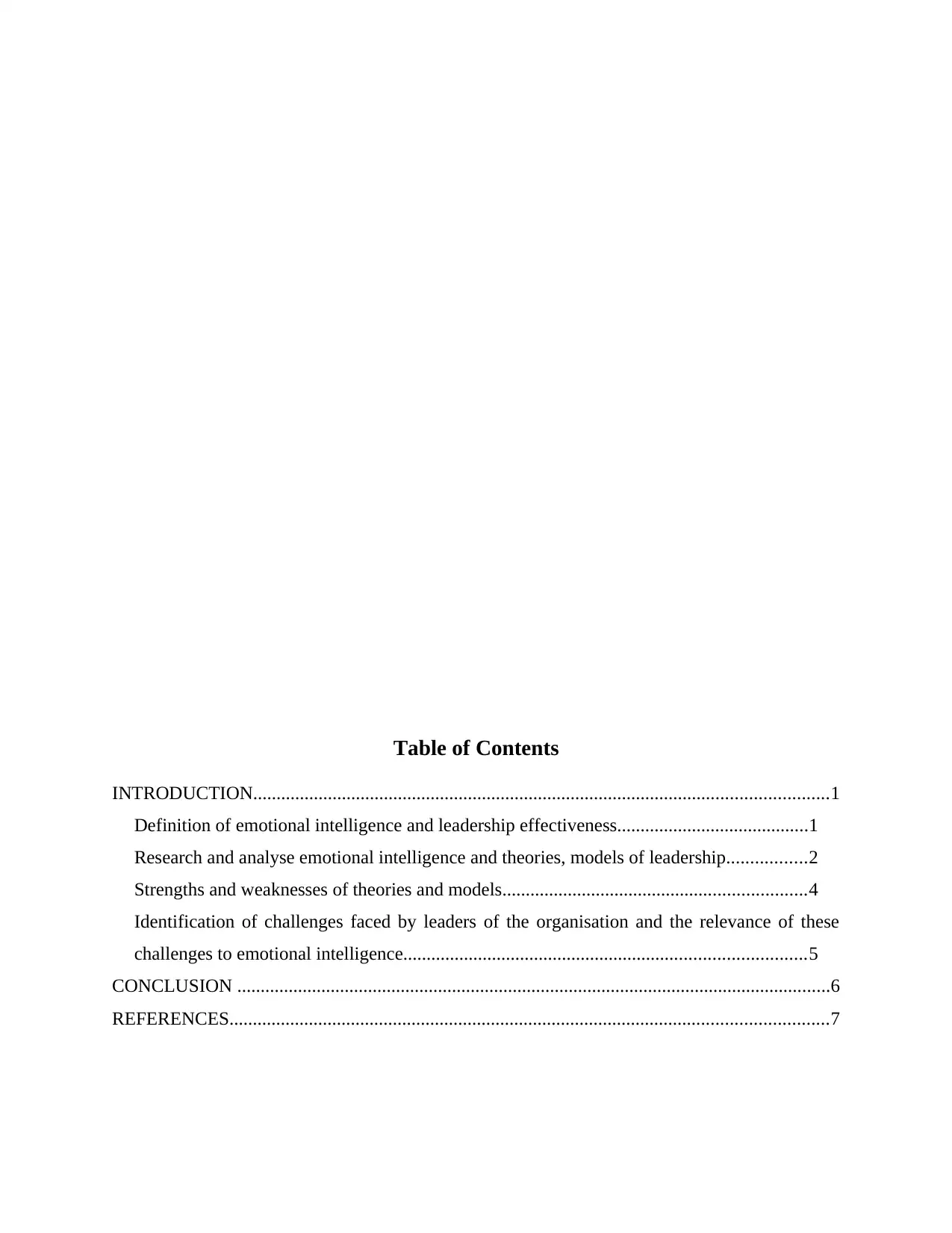
Table of Contents
INTRODUCTION...........................................................................................................................1
Definition of emotional intelligence and leadership effectiveness.........................................1
Research and analyse emotional intelligence and theories, models of leadership.................2
Strengths and weaknesses of theories and models.................................................................4
Identification of challenges faced by leaders of the organisation and the relevance of these
challenges to emotional intelligence......................................................................................5
CONCLUSION ...............................................................................................................................6
REFERENCES................................................................................................................................7
INTRODUCTION...........................................................................................................................1
Definition of emotional intelligence and leadership effectiveness.........................................1
Research and analyse emotional intelligence and theories, models of leadership.................2
Strengths and weaknesses of theories and models.................................................................4
Identification of challenges faced by leaders of the organisation and the relevance of these
challenges to emotional intelligence......................................................................................5
CONCLUSION ...............................................................................................................................6
REFERENCES................................................................................................................................7
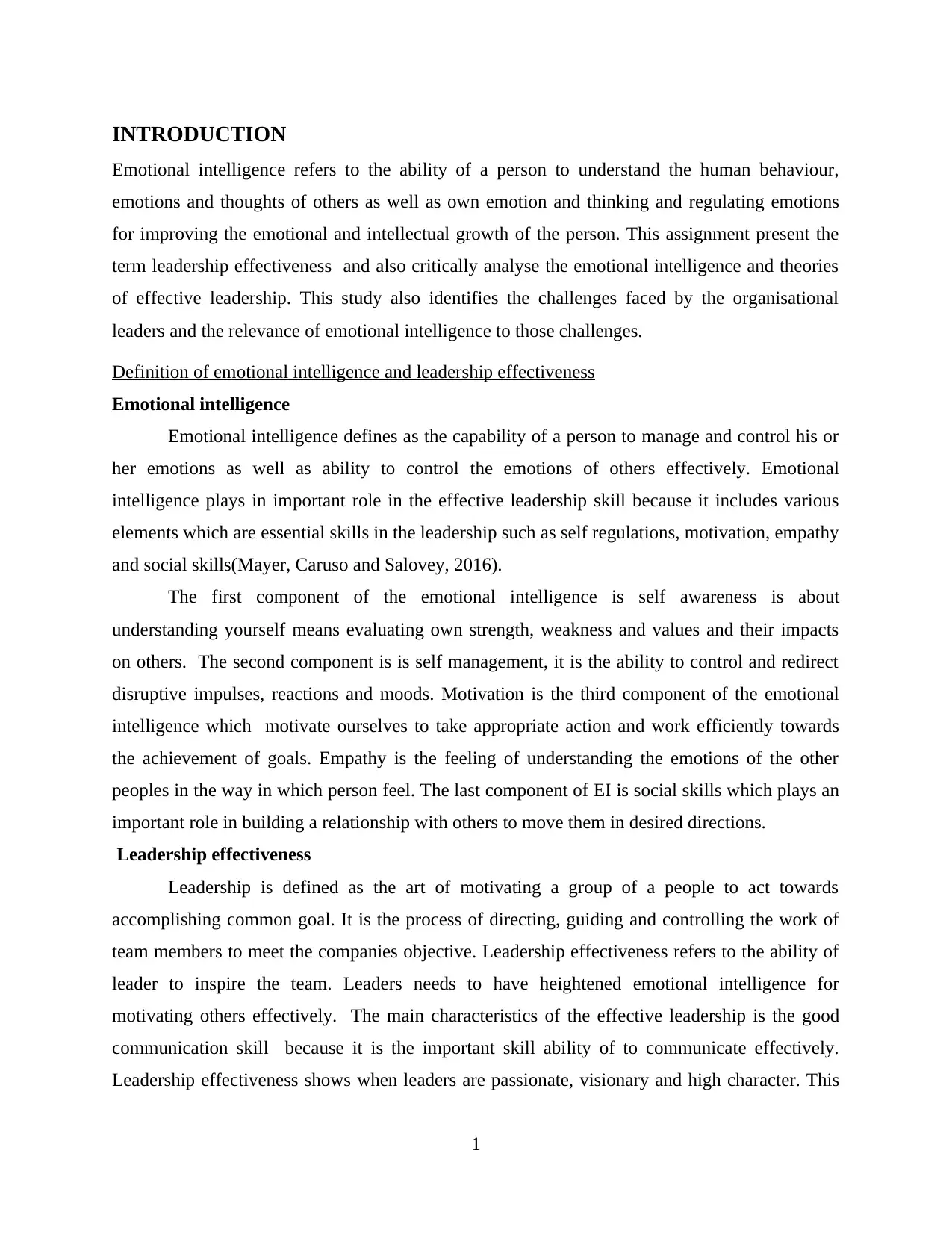
INTRODUCTION
Emotional intelligence refers to the ability of a person to understand the human behaviour,
emotions and thoughts of others as well as own emotion and thinking and regulating emotions
for improving the emotional and intellectual growth of the person. This assignment present the
term leadership effectiveness and also critically analyse the emotional intelligence and theories
of effective leadership. This study also identifies the challenges faced by the organisational
leaders and the relevance of emotional intelligence to those challenges.
Definition of emotional intelligence and leadership effectiveness
Emotional intelligence
Emotional intelligence defines as the capability of a person to manage and control his or
her emotions as well as ability to control the emotions of others effectively. Emotional
intelligence plays in important role in the effective leadership skill because it includes various
elements which are essential skills in the leadership such as self regulations, motivation, empathy
and social skills(Mayer, Caruso and Salovey, 2016).
The first component of the emotional intelligence is self awareness is about
understanding yourself means evaluating own strength, weakness and values and their impacts
on others. The second component is is self management, it is the ability to control and redirect
disruptive impulses, reactions and moods. Motivation is the third component of the emotional
intelligence which motivate ourselves to take appropriate action and work efficiently towards
the achievement of goals. Empathy is the feeling of understanding the emotions of the other
peoples in the way in which person feel. The last component of EI is social skills which plays an
important role in building a relationship with others to move them in desired directions.
Leadership effectiveness
Leadership is defined as the art of motivating a group of a people to act towards
accomplishing common goal. It is the process of directing, guiding and controlling the work of
team members to meet the companies objective. Leadership effectiveness refers to the ability of
leader to inspire the team. Leaders needs to have heightened emotional intelligence for
motivating others effectively. The main characteristics of the effective leadership is the good
communication skill because it is the important skill ability of to communicate effectively.
Leadership effectiveness shows when leaders are passionate, visionary and high character. This
1
Emotional intelligence refers to the ability of a person to understand the human behaviour,
emotions and thoughts of others as well as own emotion and thinking and regulating emotions
for improving the emotional and intellectual growth of the person. This assignment present the
term leadership effectiveness and also critically analyse the emotional intelligence and theories
of effective leadership. This study also identifies the challenges faced by the organisational
leaders and the relevance of emotional intelligence to those challenges.
Definition of emotional intelligence and leadership effectiveness
Emotional intelligence
Emotional intelligence defines as the capability of a person to manage and control his or
her emotions as well as ability to control the emotions of others effectively. Emotional
intelligence plays in important role in the effective leadership skill because it includes various
elements which are essential skills in the leadership such as self regulations, motivation, empathy
and social skills(Mayer, Caruso and Salovey, 2016).
The first component of the emotional intelligence is self awareness is about
understanding yourself means evaluating own strength, weakness and values and their impacts
on others. The second component is is self management, it is the ability to control and redirect
disruptive impulses, reactions and moods. Motivation is the third component of the emotional
intelligence which motivate ourselves to take appropriate action and work efficiently towards
the achievement of goals. Empathy is the feeling of understanding the emotions of the other
peoples in the way in which person feel. The last component of EI is social skills which plays an
important role in building a relationship with others to move them in desired directions.
Leadership effectiveness
Leadership is defined as the art of motivating a group of a people to act towards
accomplishing common goal. It is the process of directing, guiding and controlling the work of
team members to meet the companies objective. Leadership effectiveness refers to the ability of
leader to inspire the team. Leaders needs to have heightened emotional intelligence for
motivating others effectively. The main characteristics of the effective leadership is the good
communication skill because it is the important skill ability of to communicate effectively.
Leadership effectiveness shows when leaders are passionate, visionary and high character. This
1
⊘ This is a preview!⊘
Do you want full access?
Subscribe today to unlock all pages.

Trusted by 1+ million students worldwide
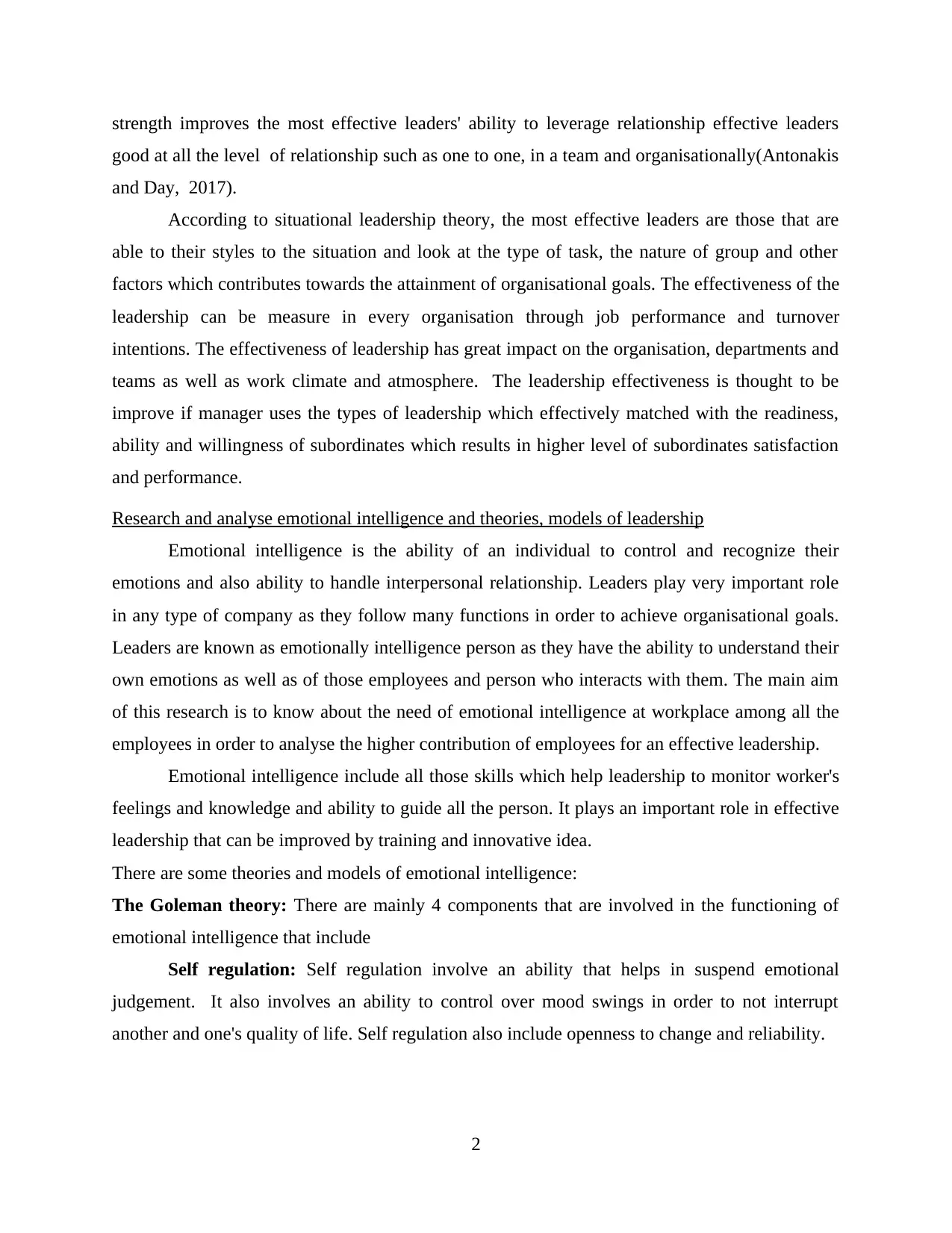
strength improves the most effective leaders' ability to leverage relationship effective leaders
good at all the level of relationship such as one to one, in a team and organisationally(Antonakis
and Day, 2017).
According to situational leadership theory, the most effective leaders are those that are
able to their styles to the situation and look at the type of task, the nature of group and other
factors which contributes towards the attainment of organisational goals. The effectiveness of the
leadership can be measure in every organisation through job performance and turnover
intentions. The effectiveness of leadership has great impact on the organisation, departments and
teams as well as work climate and atmosphere. The leadership effectiveness is thought to be
improve if manager uses the types of leadership which effectively matched with the readiness,
ability and willingness of subordinates which results in higher level of subordinates satisfaction
and performance.
Research and analyse emotional intelligence and theories, models of leadership
Emotional intelligence is the ability of an individual to control and recognize their
emotions and also ability to handle interpersonal relationship. Leaders play very important role
in any type of company as they follow many functions in order to achieve organisational goals.
Leaders are known as emotionally intelligence person as they have the ability to understand their
own emotions as well as of those employees and person who interacts with them. The main aim
of this research is to know about the need of emotional intelligence at workplace among all the
employees in order to analyse the higher contribution of employees for an effective leadership.
Emotional intelligence include all those skills which help leadership to monitor worker's
feelings and knowledge and ability to guide all the person. It plays an important role in effective
leadership that can be improved by training and innovative idea.
There are some theories and models of emotional intelligence:
The Goleman theory: There are mainly 4 components that are involved in the functioning of
emotional intelligence that include
Self regulation: Self regulation involve an ability that helps in suspend emotional
judgement. It also involves an ability to control over mood swings in order to not interrupt
another and one's quality of life. Self regulation also include openness to change and reliability.
2
good at all the level of relationship such as one to one, in a team and organisationally(Antonakis
and Day, 2017).
According to situational leadership theory, the most effective leaders are those that are
able to their styles to the situation and look at the type of task, the nature of group and other
factors which contributes towards the attainment of organisational goals. The effectiveness of the
leadership can be measure in every organisation through job performance and turnover
intentions. The effectiveness of leadership has great impact on the organisation, departments and
teams as well as work climate and atmosphere. The leadership effectiveness is thought to be
improve if manager uses the types of leadership which effectively matched with the readiness,
ability and willingness of subordinates which results in higher level of subordinates satisfaction
and performance.
Research and analyse emotional intelligence and theories, models of leadership
Emotional intelligence is the ability of an individual to control and recognize their
emotions and also ability to handle interpersonal relationship. Leaders play very important role
in any type of company as they follow many functions in order to achieve organisational goals.
Leaders are known as emotionally intelligence person as they have the ability to understand their
own emotions as well as of those employees and person who interacts with them. The main aim
of this research is to know about the need of emotional intelligence at workplace among all the
employees in order to analyse the higher contribution of employees for an effective leadership.
Emotional intelligence include all those skills which help leadership to monitor worker's
feelings and knowledge and ability to guide all the person. It plays an important role in effective
leadership that can be improved by training and innovative idea.
There are some theories and models of emotional intelligence:
The Goleman theory: There are mainly 4 components that are involved in the functioning of
emotional intelligence that include
Self regulation: Self regulation involve an ability that helps in suspend emotional
judgement. It also involves an ability to control over mood swings in order to not interrupt
another and one's quality of life. Self regulation also include openness to change and reliability.
2
Paraphrase This Document
Need a fresh take? Get an instant paraphrase of this document with our AI Paraphraser
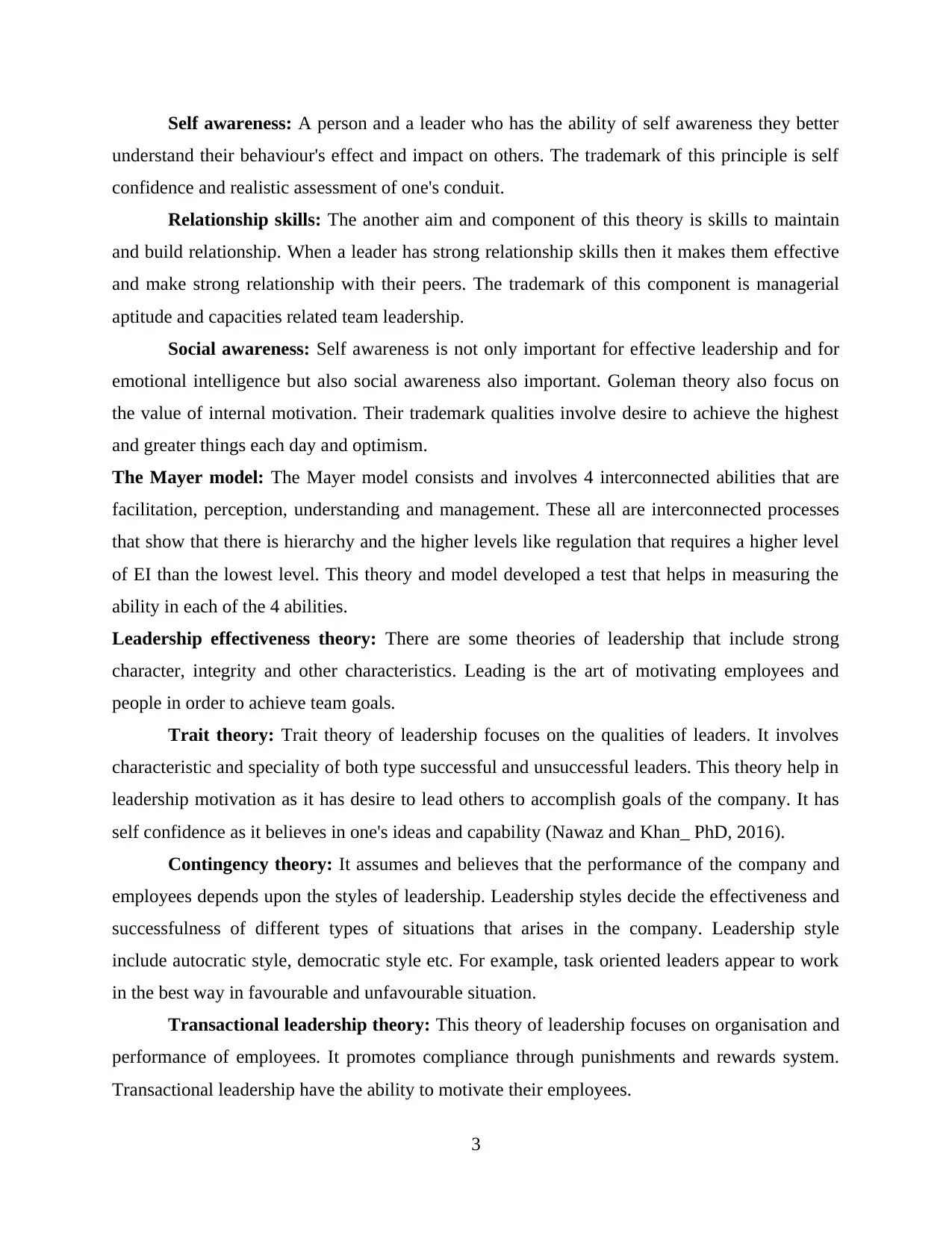
Self awareness: A person and a leader who has the ability of self awareness they better
understand their behaviour's effect and impact on others. The trademark of this principle is self
confidence and realistic assessment of one's conduit.
Relationship skills: The another aim and component of this theory is skills to maintain
and build relationship. When a leader has strong relationship skills then it makes them effective
and make strong relationship with their peers. The trademark of this component is managerial
aptitude and capacities related team leadership.
Social awareness: Self awareness is not only important for effective leadership and for
emotional intelligence but also social awareness also important. Goleman theory also focus on
the value of internal motivation. Their trademark qualities involve desire to achieve the highest
and greater things each day and optimism.
The Mayer model: The Mayer model consists and involves 4 interconnected abilities that are
facilitation, perception, understanding and management. These all are interconnected processes
that show that there is hierarchy and the higher levels like regulation that requires a higher level
of EI than the lowest level. This theory and model developed a test that helps in measuring the
ability in each of the 4 abilities.
Leadership effectiveness theory: There are some theories of leadership that include strong
character, integrity and other characteristics. Leading is the art of motivating employees and
people in order to achieve team goals.
Trait theory: Trait theory of leadership focuses on the qualities of leaders. It involves
characteristic and speciality of both type successful and unsuccessful leaders. This theory help in
leadership motivation as it has desire to lead others to accomplish goals of the company. It has
self confidence as it believes in one's ideas and capability (Nawaz and Khan_ PhD, 2016).
Contingency theory: It assumes and believes that the performance of the company and
employees depends upon the styles of leadership. Leadership styles decide the effectiveness and
successfulness of different types of situations that arises in the company. Leadership style
include autocratic style, democratic style etc. For example, task oriented leaders appear to work
in the best way in favourable and unfavourable situation.
Transactional leadership theory: This theory of leadership focuses on organisation and
performance of employees. It promotes compliance through punishments and rewards system.
Transactional leadership have the ability to motivate their employees.
3
understand their behaviour's effect and impact on others. The trademark of this principle is self
confidence and realistic assessment of one's conduit.
Relationship skills: The another aim and component of this theory is skills to maintain
and build relationship. When a leader has strong relationship skills then it makes them effective
and make strong relationship with their peers. The trademark of this component is managerial
aptitude and capacities related team leadership.
Social awareness: Self awareness is not only important for effective leadership and for
emotional intelligence but also social awareness also important. Goleman theory also focus on
the value of internal motivation. Their trademark qualities involve desire to achieve the highest
and greater things each day and optimism.
The Mayer model: The Mayer model consists and involves 4 interconnected abilities that are
facilitation, perception, understanding and management. These all are interconnected processes
that show that there is hierarchy and the higher levels like regulation that requires a higher level
of EI than the lowest level. This theory and model developed a test that helps in measuring the
ability in each of the 4 abilities.
Leadership effectiveness theory: There are some theories of leadership that include strong
character, integrity and other characteristics. Leading is the art of motivating employees and
people in order to achieve team goals.
Trait theory: Trait theory of leadership focuses on the qualities of leaders. It involves
characteristic and speciality of both type successful and unsuccessful leaders. This theory help in
leadership motivation as it has desire to lead others to accomplish goals of the company. It has
self confidence as it believes in one's ideas and capability (Nawaz and Khan_ PhD, 2016).
Contingency theory: It assumes and believes that the performance of the company and
employees depends upon the styles of leadership. Leadership styles decide the effectiveness and
successfulness of different types of situations that arises in the company. Leadership style
include autocratic style, democratic style etc. For example, task oriented leaders appear to work
in the best way in favourable and unfavourable situation.
Transactional leadership theory: This theory of leadership focuses on organisation and
performance of employees. It promotes compliance through punishments and rewards system.
Transactional leadership have the ability to motivate their employees.
3
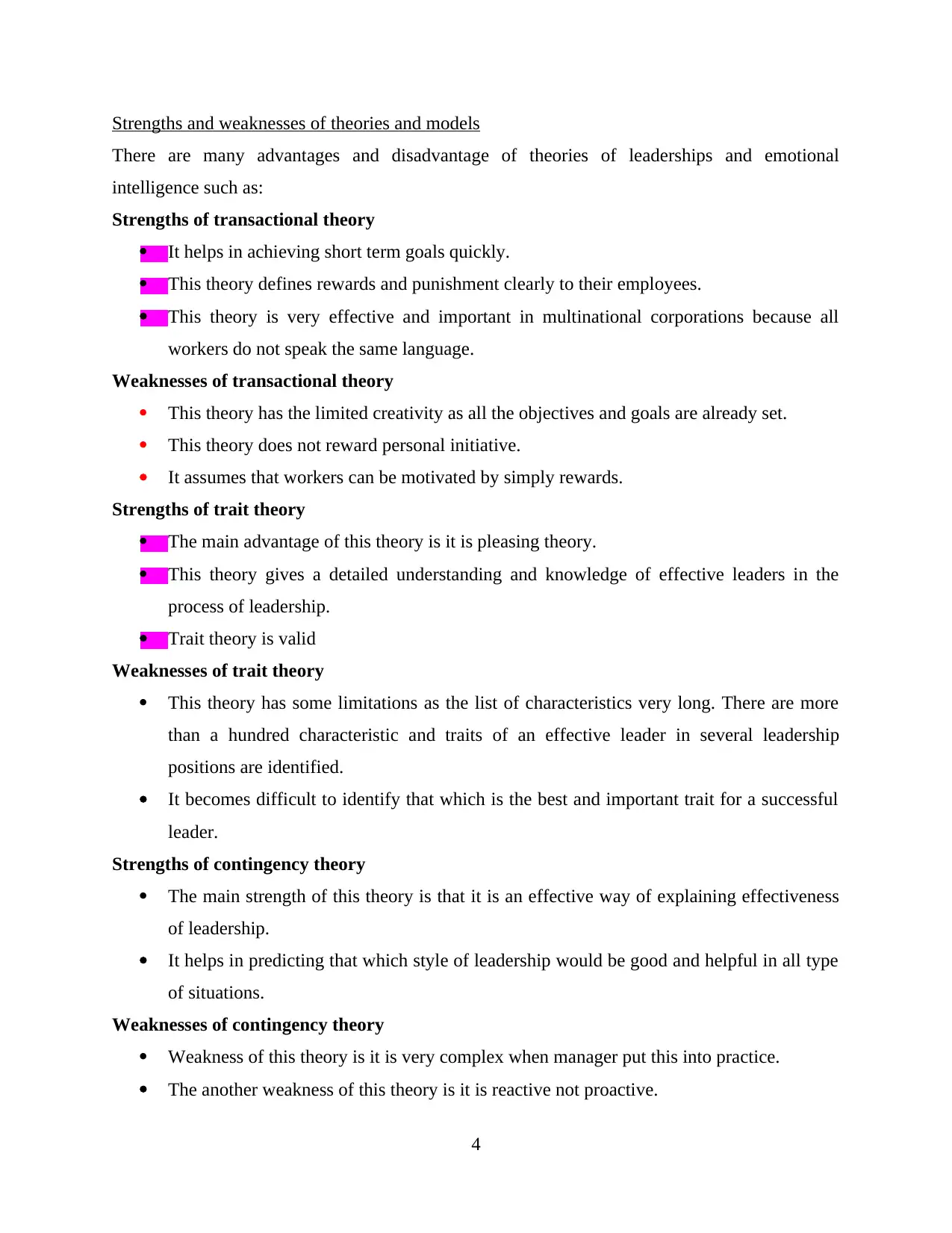
Strengths and weaknesses of theories and models
There are many advantages and disadvantage of theories of leaderships and emotional
intelligence such as:
Strengths of transactional theory
It helps in achieving short term goals quickly.
This theory defines rewards and punishment clearly to their employees.
This theory is very effective and important in multinational corporations because all
workers do not speak the same language.
Weaknesses of transactional theory
This theory has the limited creativity as all the objectives and goals are already set.
This theory does not reward personal initiative.
It assumes that workers can be motivated by simply rewards.
Strengths of trait theory
The main advantage of this theory is it is pleasing theory.
This theory gives a detailed understanding and knowledge of effective leaders in the
process of leadership.
Trait theory is valid
Weaknesses of trait theory
This theory has some limitations as the list of characteristics very long. There are more
than a hundred characteristic and traits of an effective leader in several leadership
positions are identified.
It becomes difficult to identify that which is the best and important trait for a successful
leader.
Strengths of contingency theory
The main strength of this theory is that it is an effective way of explaining effectiveness
of leadership.
It helps in predicting that which style of leadership would be good and helpful in all type
of situations.
Weaknesses of contingency theory
Weakness of this theory is it is very complex when manager put this into practice.
The another weakness of this theory is it is reactive not proactive.
4
There are many advantages and disadvantage of theories of leaderships and emotional
intelligence such as:
Strengths of transactional theory
It helps in achieving short term goals quickly.
This theory defines rewards and punishment clearly to their employees.
This theory is very effective and important in multinational corporations because all
workers do not speak the same language.
Weaknesses of transactional theory
This theory has the limited creativity as all the objectives and goals are already set.
This theory does not reward personal initiative.
It assumes that workers can be motivated by simply rewards.
Strengths of trait theory
The main advantage of this theory is it is pleasing theory.
This theory gives a detailed understanding and knowledge of effective leaders in the
process of leadership.
Trait theory is valid
Weaknesses of trait theory
This theory has some limitations as the list of characteristics very long. There are more
than a hundred characteristic and traits of an effective leader in several leadership
positions are identified.
It becomes difficult to identify that which is the best and important trait for a successful
leader.
Strengths of contingency theory
The main strength of this theory is that it is an effective way of explaining effectiveness
of leadership.
It helps in predicting that which style of leadership would be good and helpful in all type
of situations.
Weaknesses of contingency theory
Weakness of this theory is it is very complex when manager put this into practice.
The another weakness of this theory is it is reactive not proactive.
4
⊘ This is a preview!⊘
Do you want full access?
Subscribe today to unlock all pages.

Trusted by 1+ million students worldwide
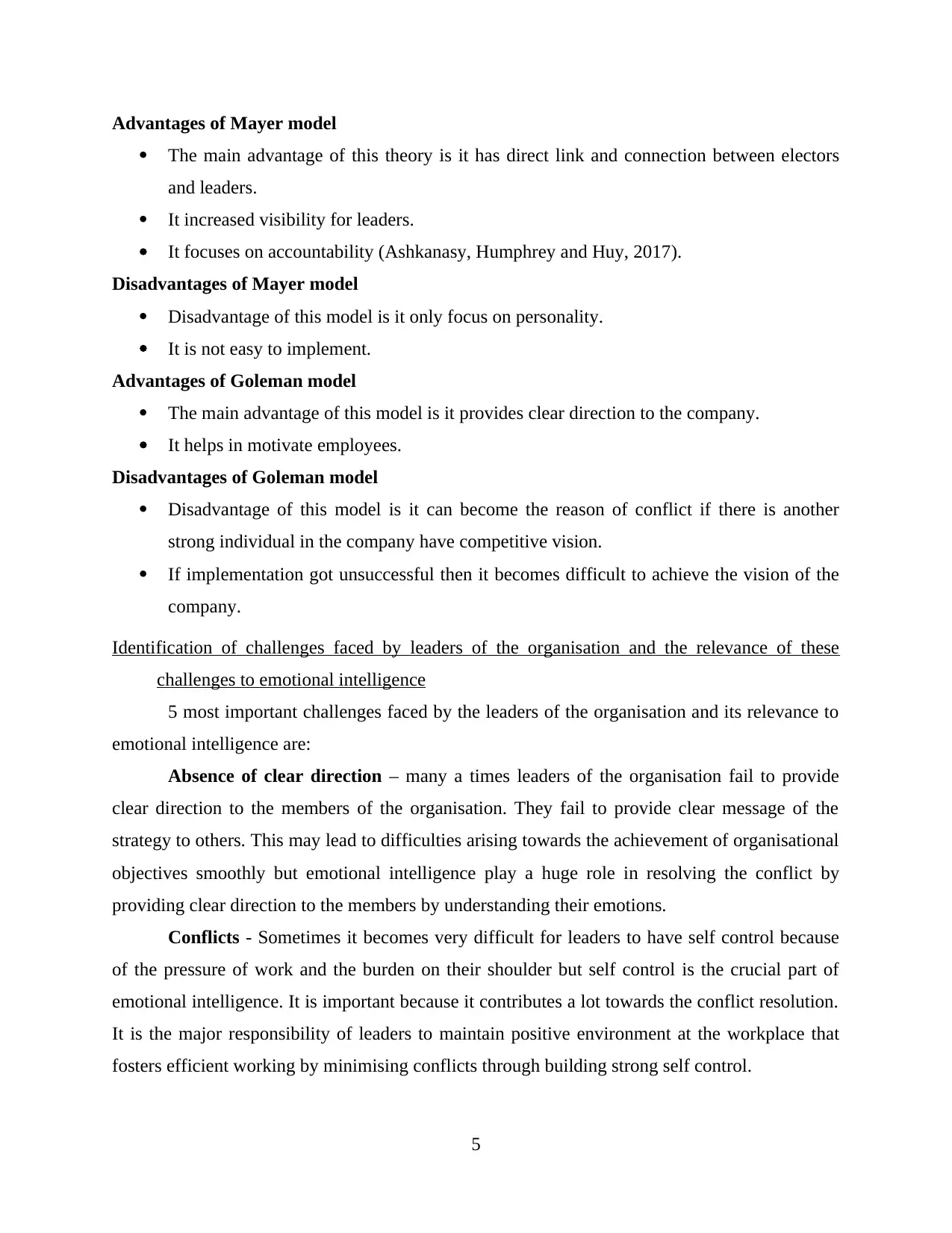
Advantages of Mayer model
The main advantage of this theory is it has direct link and connection between electors
and leaders.
It increased visibility for leaders.
It focuses on accountability (Ashkanasy, Humphrey and Huy, 2017).
Disadvantages of Mayer model
Disadvantage of this model is it only focus on personality.
It is not easy to implement.
Advantages of Goleman model
The main advantage of this model is it provides clear direction to the company.
It helps in motivate employees.
Disadvantages of Goleman model
Disadvantage of this model is it can become the reason of conflict if there is another
strong individual in the company have competitive vision.
If implementation got unsuccessful then it becomes difficult to achieve the vision of the
company.
Identification of challenges faced by leaders of the organisation and the relevance of these
challenges to emotional intelligence
5 most important challenges faced by the leaders of the organisation and its relevance to
emotional intelligence are:
Absence of clear direction – many a times leaders of the organisation fail to provide
clear direction to the members of the organisation. They fail to provide clear message of the
strategy to others. This may lead to difficulties arising towards the achievement of organisational
objectives smoothly but emotional intelligence play a huge role in resolving the conflict by
providing clear direction to the members by understanding their emotions.
Conflicts - Sometimes it becomes very difficult for leaders to have self control because
of the pressure of work and the burden on their shoulder but self control is the crucial part of
emotional intelligence. It is important because it contributes a lot towards the conflict resolution.
It is the major responsibility of leaders to maintain positive environment at the workplace that
fosters efficient working by minimising conflicts through building strong self control.
5
The main advantage of this theory is it has direct link and connection between electors
and leaders.
It increased visibility for leaders.
It focuses on accountability (Ashkanasy, Humphrey and Huy, 2017).
Disadvantages of Mayer model
Disadvantage of this model is it only focus on personality.
It is not easy to implement.
Advantages of Goleman model
The main advantage of this model is it provides clear direction to the company.
It helps in motivate employees.
Disadvantages of Goleman model
Disadvantage of this model is it can become the reason of conflict if there is another
strong individual in the company have competitive vision.
If implementation got unsuccessful then it becomes difficult to achieve the vision of the
company.
Identification of challenges faced by leaders of the organisation and the relevance of these
challenges to emotional intelligence
5 most important challenges faced by the leaders of the organisation and its relevance to
emotional intelligence are:
Absence of clear direction – many a times leaders of the organisation fail to provide
clear direction to the members of the organisation. They fail to provide clear message of the
strategy to others. This may lead to difficulties arising towards the achievement of organisational
objectives smoothly but emotional intelligence play a huge role in resolving the conflict by
providing clear direction to the members by understanding their emotions.
Conflicts - Sometimes it becomes very difficult for leaders to have self control because
of the pressure of work and the burden on their shoulder but self control is the crucial part of
emotional intelligence. It is important because it contributes a lot towards the conflict resolution.
It is the major responsibility of leaders to maintain positive environment at the workplace that
fosters efficient working by minimising conflicts through building strong self control.
5
Paraphrase This Document
Need a fresh take? Get an instant paraphrase of this document with our AI Paraphraser
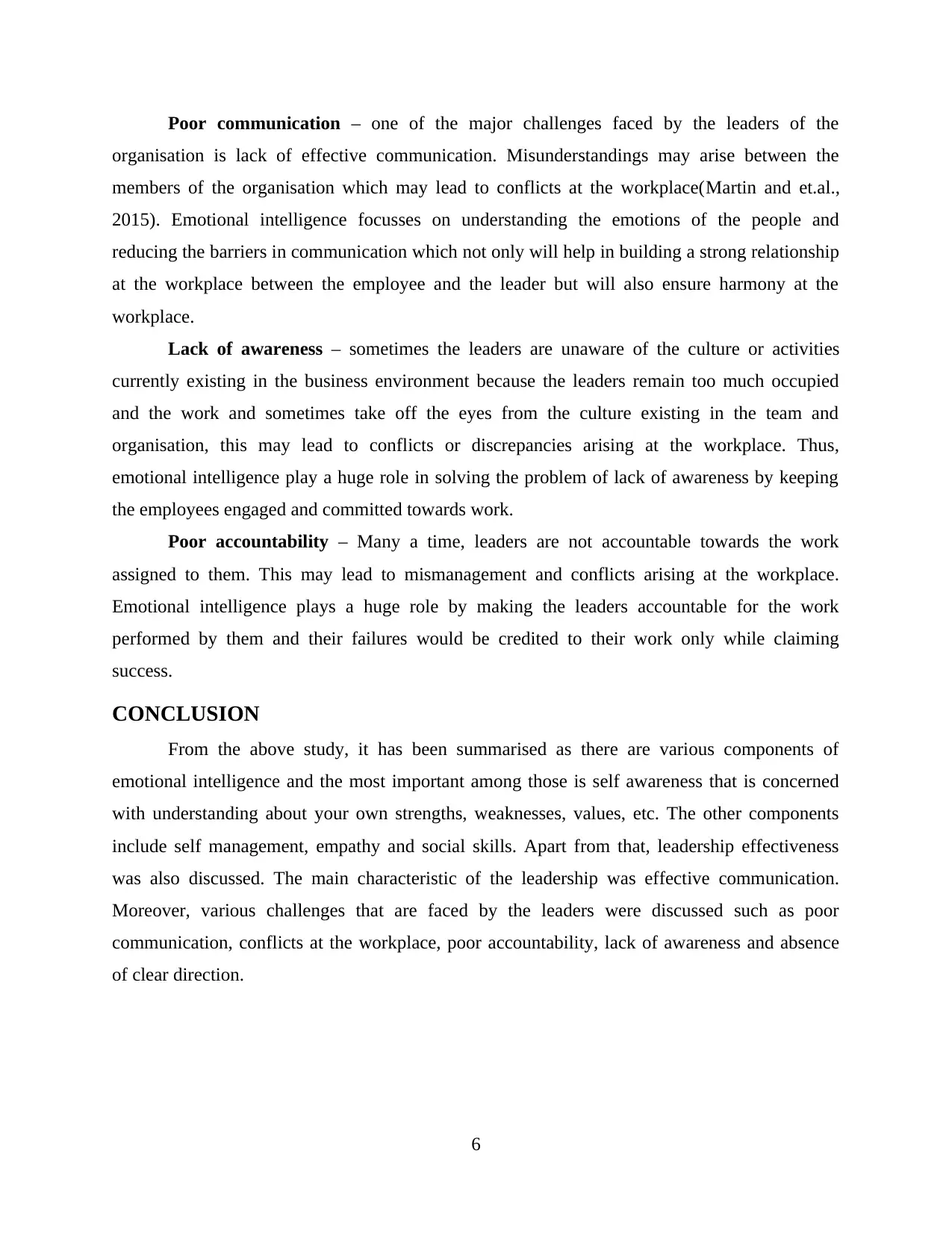
Poor communication – one of the major challenges faced by the leaders of the
organisation is lack of effective communication. Misunderstandings may arise between the
members of the organisation which may lead to conflicts at the workplace(Martin and et.al.,
2015). Emotional intelligence focusses on understanding the emotions of the people and
reducing the barriers in communication which not only will help in building a strong relationship
at the workplace between the employee and the leader but will also ensure harmony at the
workplace.
Lack of awareness – sometimes the leaders are unaware of the culture or activities
currently existing in the business environment because the leaders remain too much occupied
and the work and sometimes take off the eyes from the culture existing in the team and
organisation, this may lead to conflicts or discrepancies arising at the workplace. Thus,
emotional intelligence play a huge role in solving the problem of lack of awareness by keeping
the employees engaged and committed towards work.
Poor accountability – Many a time, leaders are not accountable towards the work
assigned to them. This may lead to mismanagement and conflicts arising at the workplace.
Emotional intelligence plays a huge role by making the leaders accountable for the work
performed by them and their failures would be credited to their work only while claiming
success.
CONCLUSION
From the above study, it has been summarised as there are various components of
emotional intelligence and the most important among those is self awareness that is concerned
with understanding about your own strengths, weaknesses, values, etc. The other components
include self management, empathy and social skills. Apart from that, leadership effectiveness
was also discussed. The main characteristic of the leadership was effective communication.
Moreover, various challenges that are faced by the leaders were discussed such as poor
communication, conflicts at the workplace, poor accountability, lack of awareness and absence
of clear direction.
6
organisation is lack of effective communication. Misunderstandings may arise between the
members of the organisation which may lead to conflicts at the workplace(Martin and et.al.,
2015). Emotional intelligence focusses on understanding the emotions of the people and
reducing the barriers in communication which not only will help in building a strong relationship
at the workplace between the employee and the leader but will also ensure harmony at the
workplace.
Lack of awareness – sometimes the leaders are unaware of the culture or activities
currently existing in the business environment because the leaders remain too much occupied
and the work and sometimes take off the eyes from the culture existing in the team and
organisation, this may lead to conflicts or discrepancies arising at the workplace. Thus,
emotional intelligence play a huge role in solving the problem of lack of awareness by keeping
the employees engaged and committed towards work.
Poor accountability – Many a time, leaders are not accountable towards the work
assigned to them. This may lead to mismanagement and conflicts arising at the workplace.
Emotional intelligence plays a huge role by making the leaders accountable for the work
performed by them and their failures would be credited to their work only while claiming
success.
CONCLUSION
From the above study, it has been summarised as there are various components of
emotional intelligence and the most important among those is self awareness that is concerned
with understanding about your own strengths, weaknesses, values, etc. The other components
include self management, empathy and social skills. Apart from that, leadership effectiveness
was also discussed. The main characteristic of the leadership was effective communication.
Moreover, various challenges that are faced by the leaders were discussed such as poor
communication, conflicts at the workplace, poor accountability, lack of awareness and absence
of clear direction.
6
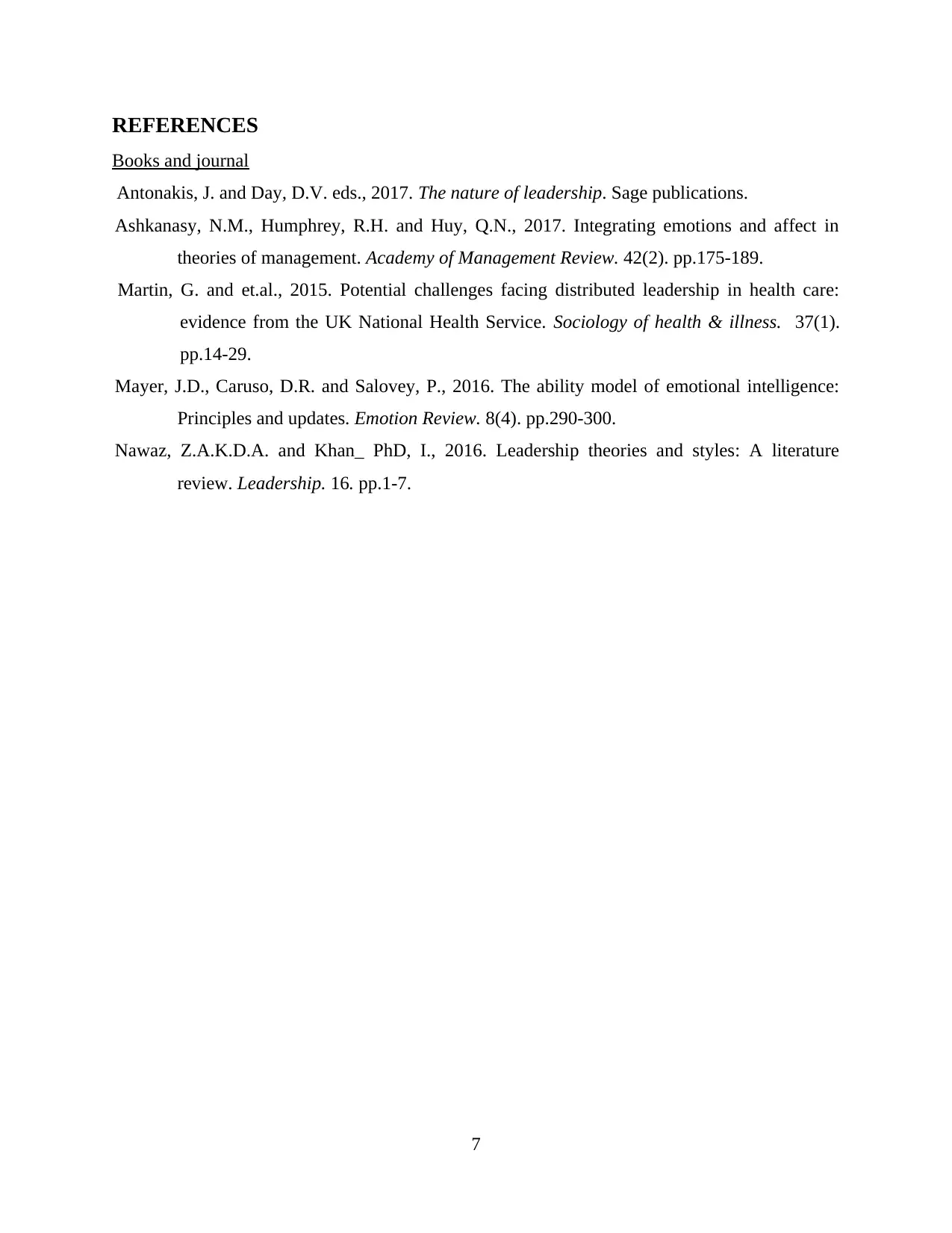
REFERENCES
Books and journal
Antonakis, J. and Day, D.V. eds., 2017. The nature of leadership. Sage publications.
Ashkanasy, N.M., Humphrey, R.H. and Huy, Q.N., 2017. Integrating emotions and affect in
theories of management. Academy of Management Review. 42(2). pp.175-189.
Martin, G. and et.al., 2015. Potential challenges facing distributed leadership in health care:
evidence from the UK National Health Service. Sociology of health & illness. 37(1).
pp.14-29.
Mayer, J.D., Caruso, D.R. and Salovey, P., 2016. The ability model of emotional intelligence:
Principles and updates. Emotion Review. 8(4). pp.290-300.
Nawaz, Z.A.K.D.A. and Khan_ PhD, I., 2016. Leadership theories and styles: A literature
review. Leadership. 16. pp.1-7.
7
Books and journal
Antonakis, J. and Day, D.V. eds., 2017. The nature of leadership. Sage publications.
Ashkanasy, N.M., Humphrey, R.H. and Huy, Q.N., 2017. Integrating emotions and affect in
theories of management. Academy of Management Review. 42(2). pp.175-189.
Martin, G. and et.al., 2015. Potential challenges facing distributed leadership in health care:
evidence from the UK National Health Service. Sociology of health & illness. 37(1).
pp.14-29.
Mayer, J.D., Caruso, D.R. and Salovey, P., 2016. The ability model of emotional intelligence:
Principles and updates. Emotion Review. 8(4). pp.290-300.
Nawaz, Z.A.K.D.A. and Khan_ PhD, I., 2016. Leadership theories and styles: A literature
review. Leadership. 16. pp.1-7.
7
⊘ This is a preview!⊘
Do you want full access?
Subscribe today to unlock all pages.

Trusted by 1+ million students worldwide
1 out of 9
Related Documents
Your All-in-One AI-Powered Toolkit for Academic Success.
+13062052269
info@desklib.com
Available 24*7 on WhatsApp / Email
![[object Object]](/_next/static/media/star-bottom.7253800d.svg)
Unlock your academic potential
Copyright © 2020–2026 A2Z Services. All Rights Reserved. Developed and managed by ZUCOL.





